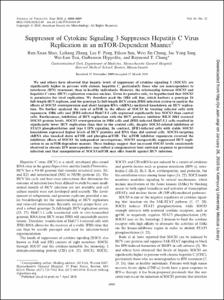KUMEL Repository
1. Journal Papers (연구논문)
1. School of Medicine (의과대학)
Dept. of Internal Medicine (내과학)
Suppressor of Cytokine Signaling 3 Suppresses Hepatitis C Virus Replication in an mTOR-Dependent Manner
- Affiliated Author(s)
- 정우진
- Alternative Author(s)
- Chung, Woo Jin
- Journal Title
- Journal of Virology
- ISSN
- 0022-538X
- Issued Date
- 2010
- Abstract
- We and others have observed that hepatic levels of suppressor of cytokine signaling 3 (SOCS3) are significantly higher in persons with chronic hepatitis C, particularly those who are nonresponders to interferon (IFN) treatment, than in healthy individuals. However, the relationship between SOCS3 and hepatitis C virus (HCV) replication remains unclear. Given its putative role, we hypothesized that SOCS3 is permissive for viral replication. We therefore used the OR6 cell line, which harbors a genotype 1b full-length HCV replicon, and the genotype 2a full-length HCV strain JFH1 infection system to analyze the effects of SOCS3 overexpression and short hairpin RNA (shRNA)-mediated knockdown on HCV replication. We further analyzed the role of mTOR in the effects of SOCS3 by treating selected cells with rapamycin. OR6 cells and JFH1-infected Huh7.5.1 cells expressed significantly less SOCS3 than control cells. Furthermore, inhibition of HCV replication with the HCV protease inhibitor BILN 2061 restored SOCS3 protein levels. SOCS3 overexpression in OR6 cells and JFH1-infected Huh7.5.1 cells resulted in significantly lower HCV replication than that in the control cells, despite SOCS3-related inhibition of STAT1 phosphorylation and type I IFN signaling. In contrast, JFH1-infected cells with stable SOCS3 knockdown expressed higher levels of HCV proteins and RNA than did control cells. SOCS3-targeting shRNA also knocked down mTOR and phospho-mTOR. The mTOR inhibitor rapamycin reversed the inhibitory effects of SOCS3. In independent investigations, SOCS3 unexpectedly suppressed HCV replication in an mTOR-dependent manner. These findings suggest that increased SOCS3 levels consistently observed in chronic IFN nonresponders may reflect a compensatory host antiviral response to persistent infection and that manipulation of SOCS3/mTOR may offer benefit against HCV infection.
- Department
- Dept. of Internal Medicine (내과학)
- Publisher
- School of Medicine
- Citation
- Run-Xuan Shao et al. (2010). Suppressor of Cytokine Signaling 3 Suppresses Hepatitis C Virus
Replication in an mTOR-Dependent Manner. Journal of Virology, 84(12), 6060–6069. doi: 10.1128/JVI.02484-09
- Type
- Article
- ISSN
- 0022-538X
- Appears in Collections:
- 1. School of Medicine (의과대학) > Dept. of Internal Medicine (내과학)
- 파일 목록
-
-
Download
 oak-aaa-3247.pdf
기타 데이터 / 2.01 MB / Adobe PDF
oak-aaa-3247.pdf
기타 데이터 / 2.01 MB / Adobe PDF
-
Items in Repository are protected by copyright, with all rights reserved, unless otherwise indicated.